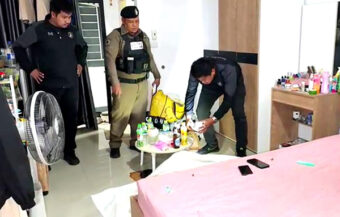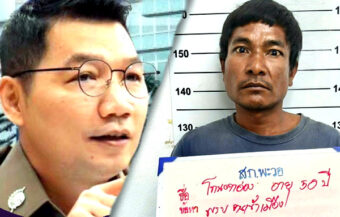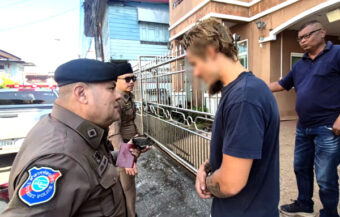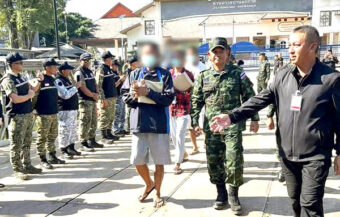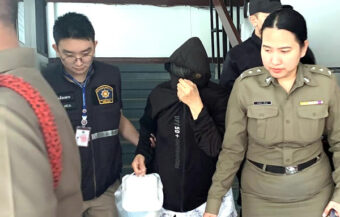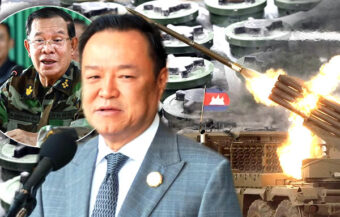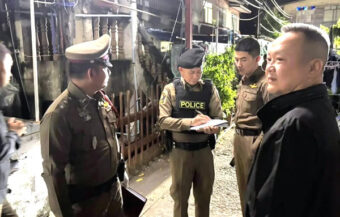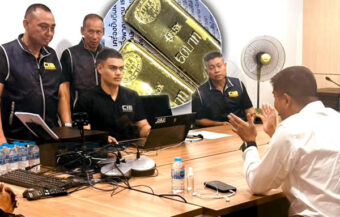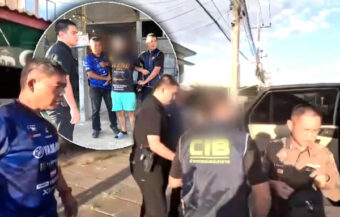Prime Minister Anutin Charnvirakul signals a potential Bhumjaithai–People’s Party coalition after a wave of MPs defect, intensifying speculation over the next government, the likely early 2026 election, and high-stakes constitutional reform in parliament.
Prime Minister Anutin Charnvirakul intensified his push to extend his minority government on Sunday by unveiling a new wave of MPs defecting to the Bhumjaithai Party. The move comes days before a high-stakes December, when either a General Election is expected, or constitutional reform legislation may force its way through parliament, though most pundits see an election as more likely. The display of political muscle quickly fuelled speculation, and by Monday, Anutin was reported as suggesting that a People’s Party–Bhumjaithai Party alliance could emerge next year to form the next government.
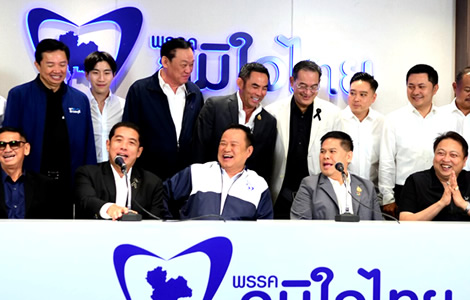
The Bhumjaithai Party moved aggressively this week as it unveiled a new bloc of MPs.
It gave Prime Minister Anutin Charnvirakul a strong public display of momentum. He currently leads an embattled minority government. He faces a tense and decisive December in Thai politics. Pressure now builds around parliament’s return.
The group included Chartthaipattana Party leader Varawut Silpa-archa and several senior colleagues. The announcement landed on Monday.
It is widely expected that Anutin will call a General Election in mid-December. Some insiders believe it may occur as early as December 12. That date coincides with the reopening of parliament. The decision remains his prerogative. He may dissolve parliament at any time if a Section 151 motion is not active. This timing is central to the current standoff.
Pheu Thai and People’s Party face strategic choices as reform bill passage remains uncertain
Meanwhile, the Pheu Thai Party has pledged to launch a Section 151 vote of confidence or censure. The vote would challenge the minority government. It would require MPs to take a clear position. It is widely thought that the People’s Party will support the motion. Yet that support is not guaranteed.
The People’s Party leader, Nattapong Ruangpanyawut, is heavily invested in constitutional reform legislation. The bill faces its third reading at the end of December. It must also pass the upper house.
That chamber is controlled by the Bhumjaithai Party. There is no certainty that the bill will pass. There is also the danger of amendments that could weaken or alter its intent. These risks complicate the People’s Party position.
Therefore, a political test begins on December 12. Pheu Thai sources now suggest delaying the motion until the reform bill is resolved. Such a delay may allow the constitutional process to finish. It may also expose any obstruction by the upper house. It may, as well, prevent Anutin from gaining the upper hand through early dissolution.
Dissolution authority and election timing heighten stakes for prime minister and coalition parties
However, timing remains fluid. Anutin can dissolve parliament before the censure motion is filed. He can do so without breaking procedure. But dissolving parliament would place the Memorandum of Understanding with the People’s Party at risk.
The MOU tied support for Anutin to four conditions. These included dissolution within four months and constitutional amendments. Reneging on these terms could have consequences after the election. It could raise questions about his political bona fides or word.
Despite the uncertainty, most observers expect an election between late January and late March 2026. Recent NIDA opinion polls indicate a wide-open race. Between 30% and 40% of voters remain undecided.
This creates space for large swings. Either the Bhumjaithai Party or the People’s Party may emerge with strong seat totals. Yet it is too early to dismiss Pheu Thai. The party still retains national reach.
High-profile defections strengthen Bhumjaithai as regional power networks shift toward the ruling party
MPs and provincial power networks continue to shift toward Bhumjaithai. On Sunday, November 23, Varawut Silpa-archa arrived at Bhumjaithai Party headquarters. He was joined by key Chartthaipattana figures. Party director Nikorn Chamnong attended.
MPs Anurak Jureemart, Sema-gun Thiantham, Panuwat Sasomsub and Supachok Khajisupakorn followed. Their move strengthened Bhumjaithai’s regional links.
Moreover, prominent provincial families stepped forward. In Chonburi, Sonthaya Khunpluem and his brother Vitthaya announced their move. In Phetchaburi, Chaiya Angkinan arrived with MP Thiwalrat Angkinan and MP Ruak Yoodee. Ruak Yoodee defected from the United Thai Nation Party. Their presence signalled a clear shift in local political machinery.
Additionally, Rayong provincial chief Piya Pitutecha attended the gathering. He is the brother of Democrat deputy leader Satit Pitutecha. He also chairs the Democrats’ candidate selection panel. His appearance displayed continued fragmentation within long-standing party structures.
Pheu Thai lawmakers join Bhumjaithai while the Prime Minister signals coalition possibilities
Even two Pheu Thai MPs surfaced at the event. Sudarat Pitakphonpanlop and Sarassanan Annanopphorn stood beside Anutin. He personally introduced them as new Bhumjaithai members. Their defection hit Pheu Thai at a sensitive moment.
Anutin told reporters the party was preparing for an election early next year. He said he had tasked Labour Minister Suchart Chomklin with overseeing candidate selection.
When pressed about internal factions, he dismissed the idea. He said there was only one group: his own. He added that all members refer to him as “phi,” or “big brother.”
He declined on Sunday to comment directly on forming a coalition with the People’s Party. Yet earlier signals suggested such a coalition was plausible. He appeared to refer to that possibility on Monday. He indicated that the next government could be built around Bhumjaithai and the People’s Party. This coalition could be augmented by the Democrat Party. Forecasts suggest the Democrats may perform better under former Prime Minister Abhisit Vejjajiva.
Potential coalition leaves Pheu Thai and Kla Tham in opposition while shaping future reform
If this alignment materialises, it would leave Pheu Thai and the Kla Tham Party in opposition. They would sit alongside former junta and conservative parties. This configuration would reshape the political balance for four years. It would also influence the shape and outcome of much-needed political reform.
Certainly, the People’s Party remains focused on replacing the 2017 Constitution. The party argues that the next government must have stability. It believes stability is essential for addressing national problems. The party views a constitutional overhaul as a prerequisite for that stability.
Political tensions escalated further this year. Former prime minister Paetongtarn Shinawatra was removed from office in August by the Constitutional Court. The ruling followed publication of a private conversation with Hun Sen, President of the Cambodian Senate.
The conversation concerned avoiding tensions with Cambodia. Nevertheless, the decision created political space. The ruling allowed Bhumjaithai to expand its influence.
People’s Party’s conditional support, while Pheu Thai slams government on trade and scandals
The People’s Party later offered to support Anutin as prime minister. However, its support came with the condition that he dissolve parliament within four months and amend the constitution. Consequently, that condition now influences every calculation. Therefore, Anutin’s next move will determine whether the MOU holds.
Meanwhile, Pheu Thai continues to highlight issues where it claims scrutiny is lacking. For instance, these include the rare-earth MOU with the United States. In addition, they also include Senate vote-fixing investigations and the unresolved Khao Kradong land dispute in Buriram.
Furthermore, they criticise the government’s handling of tensions with Cambodia. That period coincided with the U.S. Trade Representative’s decision to pause trade tariff negotiations.
Moreover, Pheu Thai argues that Bhumjaithai is consolidating power across state institutions. It points, for example, to alleged Senate influence and widespread civil-service transfers. In addition, it also warns about Bhumjaithai’s aggressive recruitment of MPs.
Prime minister sets timetable for constitutional amendment vote and potential early election call
Despite the criticism, Anutin continues to set the pace. He has instructed coalition parties to be ready for a signal on December 12. That date may mark either dissolution or a legislative manoeuvre.
He said he will bring a referendum on the constitutional amendment draft to the Cabinet. This could allow an extraordinary session on December 10 and 11. The purpose would be to amend the constitution before any election call.
Rising alarm Thailand may lose its US trade deal unless the government acts fast to restore Peace Pact
Temptation faces Prime Minister Anutin to play the nationalist card as a General Election looms in 2026
The coming weeks will be decisive. Every party faces risk. Every move now carries electoral consequences. The Prime Minister controls the timing. Pheu Thai must decide whether to strike early or wait.
The People’s Party must protect its reform agenda. Bhumjaithai must manage its new alliances. Parliament must navigate the constitutional vote. All sides now prepare for a compressed political battle. The results will shape the 2026 election and the country’s political direction at a time of underlying crisis.
Join the Thai News forum, follow Thai Examiner on Facebook here
Receive all our stories as they come out on Telegram here
Follow Thai Examiner here
Further reading:
Trump brokered peace pact between Thailand and Cambodia suspended after landmine attack this week
Prime Minister Anutin signs accord with Cambodia witnessed by US President Trump in Kuala Lumpur
Trump to oversee ground breaking new deal between Thailand and Cambodia on Saturday to map border


